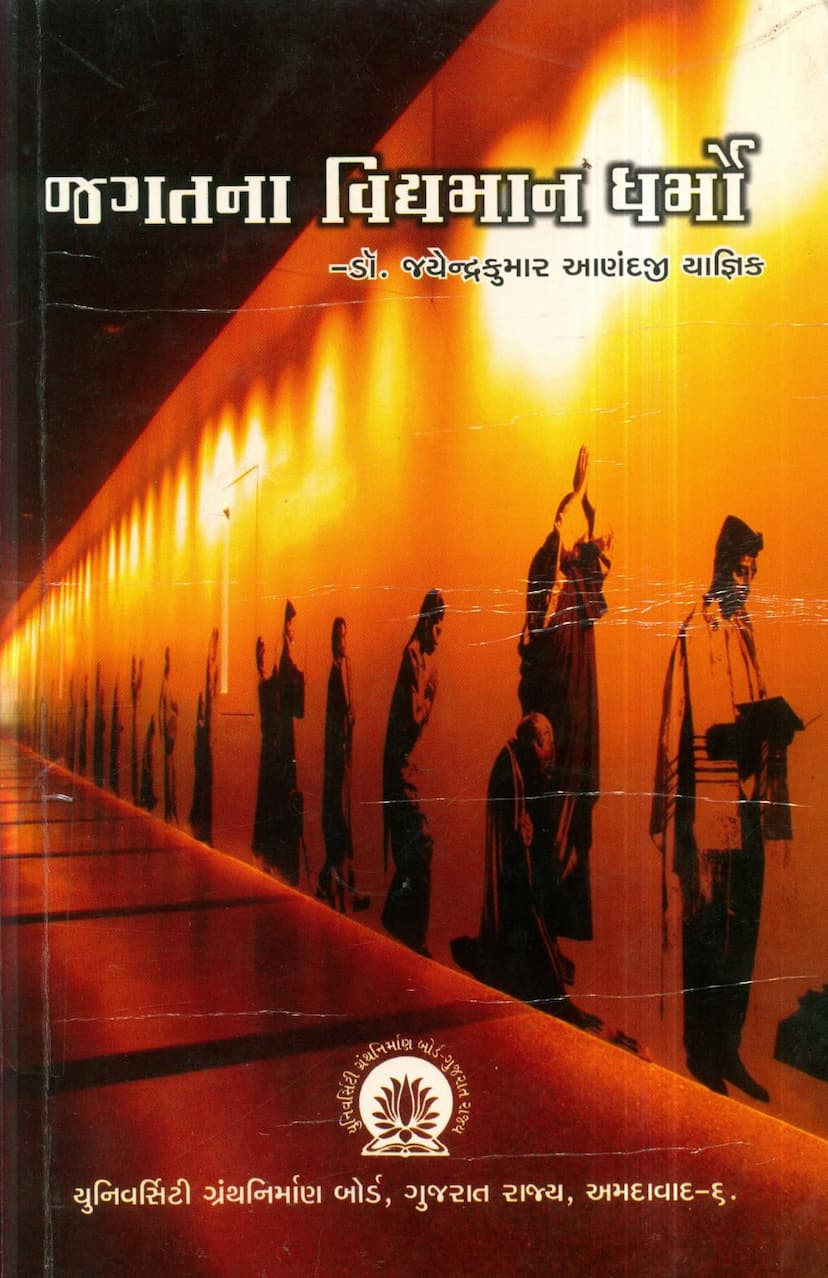Jagatna Vidyaman Dharmo
Added to library: September 1, 2025

Summary
Here's a comprehensive summary of the Jain text "Jagatna Vidyaman Dharmo" (Living Religions of the World) by Dr. Jayendrakumar Anandji Yagnik, based on the provided pages:
Book Title: Jagatna Vidyaman Dharmo (Living Religions of the World) Author: Dr. Jayendrakumar Anandji Yagnik Publisher: University Granthnirman Board, Gujarat State
Overview:
This book, "Jagatna Vidyaman Dharmo," by Dr. Jayendrakumar Anandji Yagnik, is a comparative study of living religions of the world. The author's aim is to present an introduction to various existing religions from the perspective of universal religiousness, highlighting the underlying unity present in diverse faiths. The book emphasizes that true secularism does not mean religious illiteracy but rather cultivating deep spirituality by transcending sectarian narrowness. The book is presented as a valuable reference for students, educators, and anyone interested in religious studies.
Key Themes and Structure:
The book is structured to provide a comprehensive overview of major world religions, exploring their philosophical principles, ethical guidelines, devotional aspects, and renunciatory elements. The overarching goal is to foster religious tolerance and deeper spiritual understanding.
Author's Background:
Dr. Jayendrakumar Anandji Yagnik is presented as a distinguished academician with a strong background in philosophy. His extensive academic career includes multiple degrees (M.A., Ph.D.), numerous teaching positions at prominent universities (including Professor and Head of the Philosophy Department at Gujarat University), and significant contributions to academic discourse through publications and participation in conferences. He has also been recognized for his role in establishing an international value education center.
Key Content Areas Covered:
The book's table of contents reveals a systematic approach to understanding religions:
- Chapter 1: Dharmatattvavichar (The Philosophy of Religion): This foundational chapter likely delves into the nature of religion, its importance for humanity, and the distinction between human beings and other animals based on the presence of religion. It may also explore the inherent aspects of religious life, such as knowledge, devotion, ethics, and detachment. The relationship between religion and science is also discussed.
- Chapter 2: Dharmona Abhyas Pratyeno Abhigam (Approach to the Study of Religions): This section likely focuses on how to study religions comparatively, acknowledging both the unity of religious essence and the diversity of religious practices and interpretations that arise due to geographical, historical, and psychological factors. It may also discuss various methodologies for studying religions.
- Chapters 3-17: Introduction to Specific Religions: The bulk of the book is dedicated to providing detailed introductions to major world religions. The summary indicates coverage of:
- Hindu Dharma and its scriptures
- Jain Dharma (authored by Dal Sukhbhai Malvania)
- Buddhism (authored by Naginbhai Shah)
- Sikh Dharma (authored by Upendrarai Sandesara)
- Zoroastrianism (authored by Neela J. Joshi)
- Judaism (authored by Umeshkumar Yagnik)
- Christianity (authored by Umeshkumar Yagnik)
- Islam (authored by Umeshkumar Yagnik)
- Confucianism (authored by Kailasbehan Patel)
- Taoism (authored by Mukund Kotecha)
- Shintoism (authored by Hariprasad Pathak)
- Chapter 16: Dharmono Tulnatmak Adhyayan (Comparative Study of Religions): This concluding chapter likely synthesizes the information presented in the previous chapters, drawing comparisons and contrasts between the different religions based on their philosophical tenets, ethical frameworks, devotional practices, and renunciatory aspects. It aims to highlight the common threads and underlying unity among diverse religious traditions.
Emphasis on Religious Tolerance and Understanding:
A recurring theme is the importance of religious tolerance and the recognition of the shared quest for spiritual truth across different faiths. The book champions the idea of understanding and respecting diverse religious perspectives, moving beyond sectarianism towards a broader spiritual outlook.
Educational Value:
The book is designed to be an accessible and authoritative resource for students and the general public interested in comparative religion. The detailed bibliographical references at the end of each chapter and the comprehensive reference list at the end of the book underscore its scholarly rigor.
Publisher's Support:
The University Granthnirman Board, Gujarat State, plays a crucial role in publishing such academic works, supporting the production of books in regional languages for university-level education. The repeated reprinting of the book (1984, 1993, 2011) indicates its popularity and continued relevance.
In essence, "Jagatna Vidyaman Dharmo" is a significant contribution to the field of religious studies, offering a well-researched and thoughtfully presented exploration of the world's major living religions with a focus on their commonalities and the promotion of interfaith understanding.